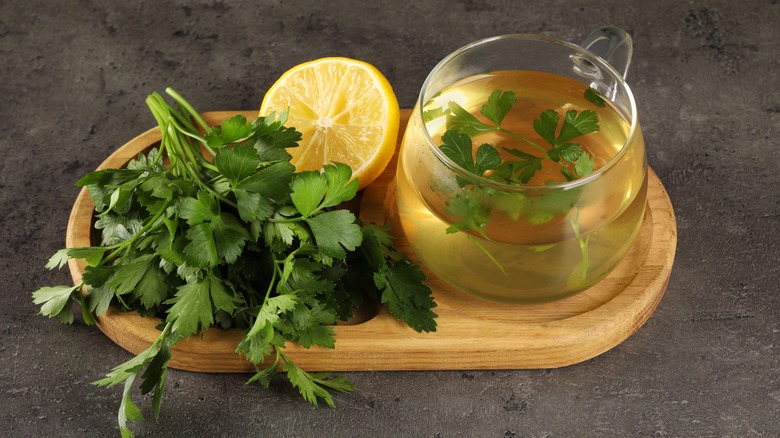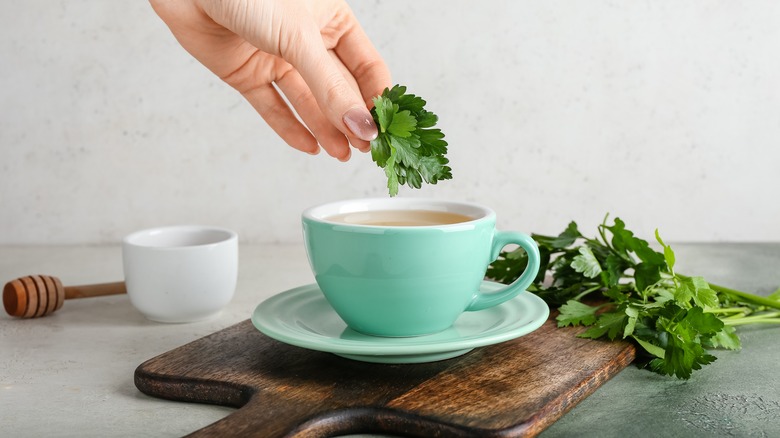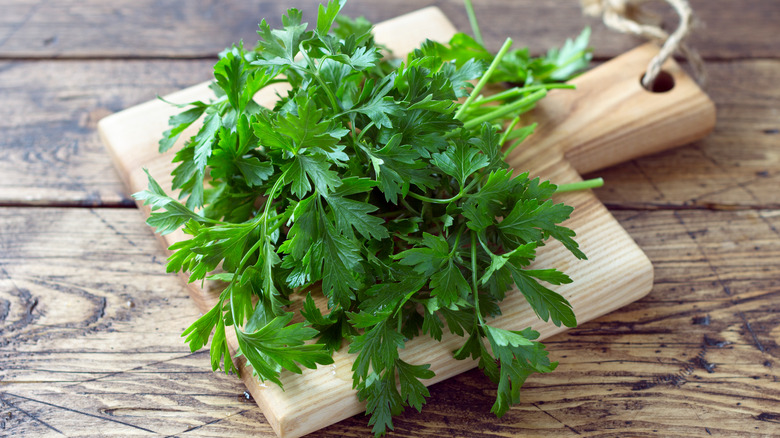Are There Any Nutritional Benefits To Parsley Tea?
Usually, when we think of parsley, we think of that awkward sprig that sits on your plate as a garnish at a fancy (if a little outdated) steakhouse. It's as robust in flavor as in texture, and can add a little extra brightness when finishing all kinds of dishes, from soup to meat. But did you know that you can drink parsley as a tea? Moreover, why would you want to drink parsley tea? Firstly, it's actually more delicious than it sounds, and it has a slew of nutritional benefits to boot — including heart and kidney health, among others.
Parsley tea isn't technically tea; as it is with most herbal tea, there aren't any actual tea leaves in it. Nevertheless, it's as simple as steeping chopped parsley leaves — flat-leaf or curly, it doesn't matter. You can even reap the benefits of parsley from dried leaves, although the fresh stuff is more potent, as some of the nutrients are more active in fresh leaves.
It's an antioxidant powerhouse
As Healthline notes, parsley is packed with antioxidants and flavonoids, both of which are proven to reduce tumors and help prevent cancerous cells from spreading and reproducing, according to a study published by the National Library of Medicine (NIH). Its antioxidant content also helps with cellular regeneration and can improve the quality of bone density and skin elasticity. Parsley is a diuretic, which is not only good for water retention but also helps support kidney health (it is even believed that diuretics can help prevent the development of kidney stones).
Parsley is incredibly rich in vitamins C, A, and K. If you don't know, vitamin C isn't only responsible for helping to stave off illnesses like colds and flu, but it's responsible for synthesizing collagen in the body. Vitamin C and K especially are beneficial to mature bodies and people suffering from connective tissue dysfunction such as hypermobile EDS, according to the NIH. Vitamin K is also helpful for those with circulatory issues as it helps to thin blood. But it's important to note that if you are on blood-thinning medication, you may want to consult your doctor before incorporating parsley tea into your regimen.
Additional benefits and how to prepare parsley tea
Healthline also notes that some people claim a few additional benefits of parsley tea, including hormonal balance and reproductive health for people who menstruate. But in reality, much of this is either anecdotal evidence or is based on little scientific research, so these claims cannot be confirmed. Parsley can, however, aid in blood sugar regulation and may be a helpful supplement — alongside prescribed diabetic medication — for maintaining healthy A1C levels. But again, it's vital to consult a healthcare professional if you're taking pharmaceuticals to manage a chronic health condition such as diabetes.
Parsley is part of the carrot family, which means that not only are its leaves edible, but the whole plant can be eaten — roots and all. This means you can make parsley tea out of every part of the parsley plant, making great use of its otherwise compostable bits. Parsley tea is simple to make: Start by chopping about ¼ cup of fresh parsley leaves, then steep in boiling water for up to 15 minutes. If you're using dried parsley, you can start by steeping a couple of tablespoons and then adjust to your taste. You can dress your parsley tea up with a little ginger, lemon, and honey for a bright, delicious, and healthy refreshment.


